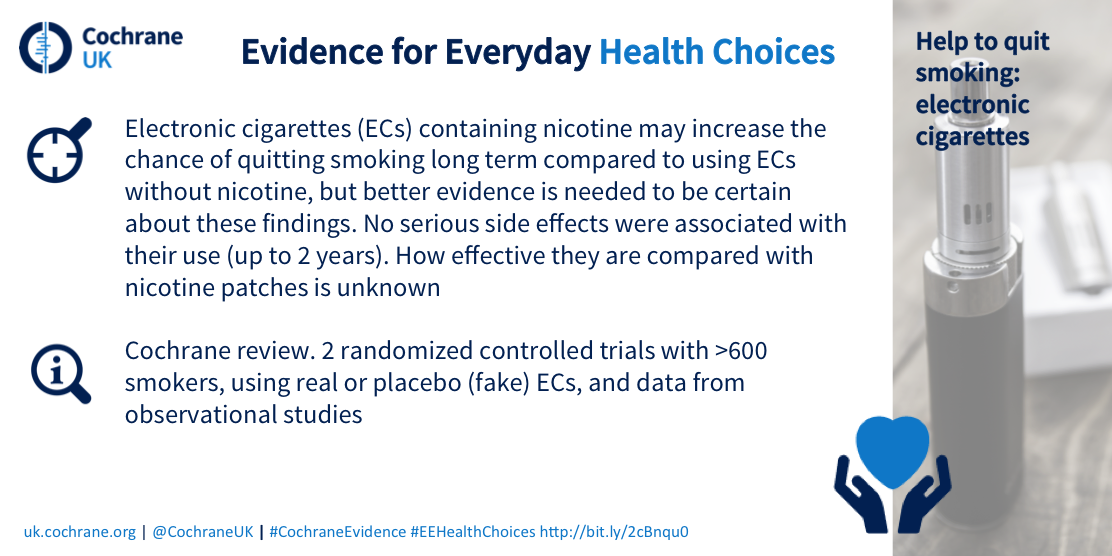An updated Cochrane Review provides an independent, rigorous assessment of the best available evidence to date about electronic cigarettes for quitting smoking.
Scroll to the bottom of this article for a round-up of media coverage
The conclusions of this updated Review are unchanged since the last review was published two years ago: electronic cigarettes may help smokers stop their smoking, and the included studies did not find any serious side effects associated with their use for up to two years.
Many studies are now underway which may help us understand more about their effects in the future.
The first Cochrane Review, published in the Cochrane Library in December 2014, showed that electronic cigarettes may be an aid to smokers in stopping their smoking. The updated Review did not find any new randomized controlled trials (RCTs) with long-term outcomes looking at the effectiveness of electronic cigarettes in helping people to stop smoking. However, this is an active area of research, with a large number of ongoing studies that will add to the evidence in the next few years.
Smoking is a significant global health problem. Despite many smokers wanting to stop, they often find it difficult to succeed in the long term. One of the most effective and widely used strategies to help combat the cravings associated with nicotine addiction is to deliver nicotine by patches and chewing gum.
Electronic cigarettes have been around in some form for a number of years, but over the past few years their popularity has increased significantly, and they have begun to look and feel less like conventional cigarettes. Unlike chewing gum and patches, they mimic the experience of cigarette smoking because they are hand-held and generate a smoke-like vapour when used. They help to recreate similar sensations of smoking without exposing users or others to the smoke from conventional cigarettes, and can be used to provide smokers with nicotine. Though they are used by many smokers, little is still known about how effective they are at helping people stop smoking.
This version of the updated Cochrane Review includes no new RCTs. The original Review included two RCTs involving more than 600 participants, and found that electronic cigarettes containing nicotine may increase the chances of stopping smoking within six to 12 months, compared to using an electronic cigarette without nicotine. The researchers could not determine whether using electronic cigarettes was better than a nicotine patch in helping people stop smoking, because there were not enough people taking part in the study.
This updated Review now includes observational data from an additional 11 studies. Of the studies which measured side effects, none found any serious side effects of using electronic cigarettes for up to two years. The studies showed that throat and mouth irritation are the most commonly reported side effects in the short to medium term (up to two years).
The lead author of this Cochrane Review, Jamie Hartmann-Boyce from the Cochrane Tobacco Addiction Group, said, “The randomized evidence on smoking cessation is unchanged since the last version of the Review. We are encouraged to find many studies are now underway, particularly as electronic cigarettes are an evolving technology. Since the last version of the Review, 11 new observational and uncontrolled studies have been published. In terms of quitting, these can’t provide the same information we get from randomized controlled trials, but they contribute further information on the side effects of using electronic cigarettes to quit smoking. None detected any serious side effects, but longer term data are needed.”

Read this Press Release in Polish.
Editor’s notes
Full citation: Hartmann-Boyce J, McRobbie H, Bullen C, Begh R, Stead LF, Hajek P. Electronic cigarettes for smoking cessation. Cochrane Database of Systematic Reviews 2016, Issue 9. Art. No.: CD010216. DOI: 10.1002/14651858.CD010216.pub3.
Cochrane Review Author contact details: jamie.hartmann-boyce@phc.ox.ac.uk
For all media enquiries, please contact:
Jo Anthony
Senior Media and Communications Officer, Cochrane
M +44(0) 7582 726 634 E janthony@cochrane.org or pressoffice@cochrane.org
About Cochrane
Cochrane is a global independent network of researchers, professionals, patients, carers, and people interested in health.
Cochrane produces reviews which study all of the best available evidence generated through research and make it easier to inform decisions about health. These are called systematic reviews.
Cochrane is a not-for-profit organization with collaborators from more than 130 countries working together to produce credible, accessible health information that is free from commercial sponsorship and other conflicts of interest. Our work is recognized as representing an international gold standard for high quality, trusted information.
Find out more at cochrane.org | Follow us on twitter @cochranecollab
If you are a journalist or member of the press and wish to receive news alerts before their online publication or if you wish to arrange an interview with an author, please contact the Cochrane press office: pressoffice@cochrane.org
About Wiley
Wiley is a global provider of knowledge and knowledge-enabled services that improve outcomes in areas of research, professional practice, and education. Through the Research segment, the Company provides digital and print scientific, technical, medical, and scholarly journals, reference works, books, database services, and advertising. The Professional Development segment provides digital and print books, online assessment and training services, and test prep and certification. In Education, Wiley provides education solutions including online program management services for higher education institutions and course management tools for instructors and students, as well as print and digital content. The Company's website can be accessed at http://www.wiley.com.
Selected Media Coverage:
E-cigarettes can help smokers quit, says study in The Guardian.
Why can't scientists agree on e-cigarettes? blog post in The Guardian.
E-Cigs Might Help Some Quit Smoking, New Study Reveals on Consumer Reports.
